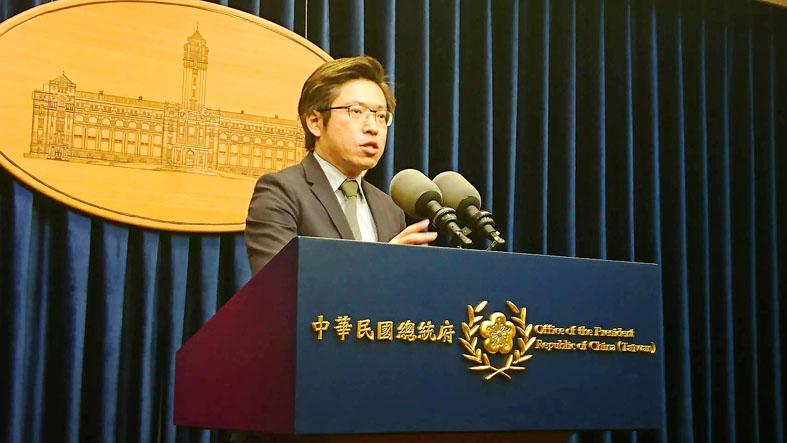President Tsai Ing-wen (蔡英文) yesterday warned Taiwanese about cognitive warfare against the nation and denied rumors that Taiwan was planning to receive water from Japan’s Fukushima Dai-ichi nuclear power plant.
The remarks came in response to a Twitter user who late on Thursday posted a document that the user claimed was from Presidential Office and showed that water from the wrecked plant was to be processed in Taiwan.
The tweet was widely shared.

Photo: Lee Hsin-fang, Taipei Times
Presidential Office spokesman Xavier Chang (張惇涵) in a statement yesterday said that the document was “a complete fabrication” and uses language that would not be used in a government document.
Tsai on Facebook reiterated the statement, saying that errors and the use of simplified Chinese suggest that the creator of the document was not familiar with Taiwan.
The social media post is “a typical example of cognitive warfare,” Tsai said, without elaborating who might be behind the document.
Threatening activities by military aircraft and ships, as well as spreading fake news to undermine the solidarity of society, are common cognitive warfare strategies, Tsai said, adding that cognitive warfare would likely become more sophisticated.
Taiwanese should be aware that disinformation from unknown sources might serve a cognitive warfare agenda, Tsai said, adding that people should not further spread such social media posts.
“Taiwan’s freedom is hard-won, and we will not allow cognitive warfare to tear apart our society,” Tsai said.

NO HUMAN ERROR: After the incident, the Coast Guard Administration said it would obtain uncrewed aerial vehicles and vessels to boost its detection capacity Authorities would improve border control to prevent unlawful entry into Taiwan’s waters and safeguard national security, the Mainland Affairs Council (MAC) said yesterday after a Chinese man reached the nation’s coast on an inflatable boat, saying he “defected to freedom.” The man was found on a rubber boat when he was about to set foot on Taiwan at the estuary of Houkeng River (後坑溪) near Taiping Borough (太平) in New Taipei City’s Linkou District (林口), authorities said. The Coast Guard Administration’s (CGA) northern branch said it received a report at 6:30am yesterday morning from the New Taipei City Fire Department about a

IN BEIJING’S FAVOR: A China Coast Guard spokesperson said that the Chinese maritime police would continue to carry out law enforcement activities in waters it claims The Philippines withdrew its coast guard vessel from a South China Sea shoal that has recently been at the center of tensions with Beijing. BRP Teresa Magbanua “was compelled to return to port” from Sabina Shoal (Xianbin Shoal, 仙濱暗沙) due to bad weather, depleted supplies and the need to evacuate personnel requiring medical care, the Philippine Coast Guard (PCG) spokesman Jay Tarriela said yesterday in a post on X. The Philippine vessel “will be in tiptop shape to resume her mission” after it has been resupplied and repaired, Philippine Executive Secretary Lucas Bersamin, who heads the nation’s maritime council, said

CHINA POLICY: At the seventh US-EU Dialogue on China, the two sides issued strong support for Taiwan and condemned China’s actions in the South China Sea The US and EU issued a joint statement on Wednesday supporting Taiwan’s international participation, notably omitting the “one China” policy in a departure from previous similar statements, following high-level talks on China and the Indo-Pacific region. The statement also urged China to show restraint in the Taiwan Strait. US Deputy Secretary of State Kurt Campbell and European External Action Service Secretary-General Stefano Sannino cochaired the seventh US-EU Dialogue on China and the sixth US-EU Indo-Pacific Consultations from Monday to Tuesday. Since the Indo-Pacific consultations were launched in 2021, references to the “one China” policy have appeared in every statement apart from the

More than 500 people on Saturday marched in New York in support of Taiwan’s entry to the UN, significantly more people than previous years. The march, coinciding with the ongoing 79th session of the UN General Assembly, comes close on the heels of growing international discourse regarding the meaning of UN Resolution 2758. Resolution 2758, adopted by the UN General Assembly in 1971, recognizes the People’s Republic of China (PRC) as the “only lawful representative of China.” It resulted in the Republic of China (ROC) losing its seat at the UN to the PRC. Taiwan has since been excluded from